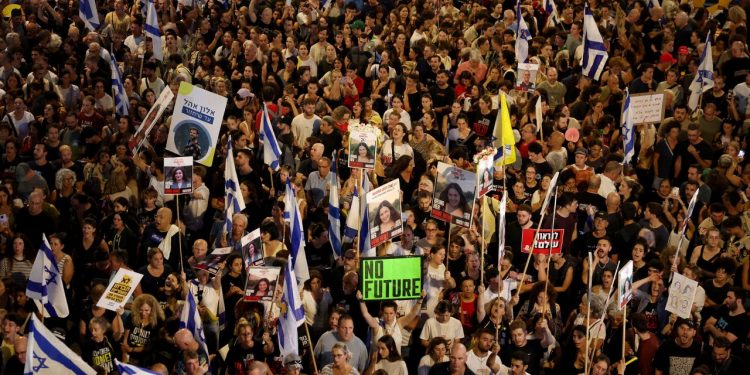Massive protests swept through Tel Aviv, Jerusalem and other Israeli cities Sunday night as tens of thousands vented their anger after the bodies of six hostages captured by Hamas on 7 October, last year were discovered in Gaza over the weekend. The huge scale of the protests with over five lakh participants, as per some media estimates, will hopefully pressurise Prime Minister Benjamin Netanyahu and his Right-wing government to go for a ceasefire and hostage release deal with the Palestinian militant outfit. There are calls from within the cabinet, for example from Defence Minister Gallant, for Netanyahu to change course as also for holding fresh elections in the country as its longest serving prime minister’s approval ratings are at their lowest.
The bodies of Carmel Gat, Hersh Goldberg-Polin, Eden Yerushalmi, Alexander Lobanov, Almog Sarusi and Ori Danino were found from a tunnel in the city of Raffah in southern Gaza even as a polio vaccination drive was launched in the war-ravaged Palestinian territory over the weekend. The hostages were shot multiple times from a close range. Of them, Goldberg-Polin, an American-Israeli, and four others were abducted from a music festival on 7 October, while the sixth was captured from a nearby farming community.
Netanyahu, despite facing immense pressure to end the war which has now been going on for close to 11 months, remained steadfast. “Whoever murders hostages – does not want a deal,” he said. On the other hand, senior Hamas officials blamed Israel’s refusal to agree to a ceasefire for the fatalities. “Netanyahu is responsible for the killing of Israeli prisoners… The Israelis should choose between Netanyahu and the deal,” senior Hamas official Sami Abu Zuhri told news agency Reuters.
There are 101 more Israeli hostages held by the Hamas militant group. It is estimated by Israeli authorities that a third of them have been killed. Israelis are polarised over the fate of their hostages, leading to one of the most distressing political conflicts in the nation’s history. Surveys indicate that a significant number of Israelis desire the return of hostages, even if it means exchanging them for Palestinian prisoners and agreeing to a ceasefire, which is indeed the need of the hour. They have lost faith in Prime Minister Benjamin Netanyahu, feeling that he has displayed a dismissive attitude towards the plight of the hostages and the suffering of their families. While this is the view of the majority of Israelis, an influential minority believes that the hostages should be regarded as a necessary sacrifice to fulfil the objectives of the war, and the government evidently intends for those objectives to encompass the ultimate conquest and settlement of Gaza.
Netanyahu wants the war to continue to that end as he is desperate to save his own political career. He has so far paid no heed to the multiple calls for a ceasefire from various stakeholders, including from the United States, Israel’s biggest ally. Unsurprisingly, this is what most despotic leaders the world over, elected or unelected, do when faced with a crisis. They take refuge in nationalism and war and in the process bring untold miseries to their victims who are mostly their own citizens.
Israel’s ground and aerial offensives in Gaza have so far claimed over 40,000 lives, mostly civilians, and ousted most of the enclave’s 2.3 million residents from their homes. A ceasefire appears to be the only hope for peace in the region and that seems to be the elusive dream.






































